This month's Insecure Writers' Support Group (IWSG) question asks writers to share their thoughts on launching their book. Specifically, What elements do you include in your book launch? Or, what do you have in mind for your future book launch? Or, what advice do you have for others planning to launch a book?
As a frugal, indie writer, I have tried many different strategies over the last decade, but I'm not sure what works best. And, I'm not sure I have the stamina to really support an all-out marketing effort that should support the launch of any book, especially when we writers spend a few years (or more) writing and revising and revising again. Here are a few that have worked for me:
- Newsletter: Most recommend developing a mailing list and sending out that newsletter consistently . . . but not so often you wind up alienating your readers! I always wonder what will interest my readers the most? It's easy to procrastinate when you're feeling uncertain.
- Presence on social media: Again, consistency and visibility. What can you offer potential readers? A glimpse into your writing life?
- Reduced pricing or give-away during a launch period: This can be a nice way to say thank you to loyal readers. Actually, this is my favorite -- and can be announced through that newsletter.
- Paid advertising: Have you explored promotional sites/offers from places like Fussy Librarian? My own experience suggests you can anticipate a bump in sales.
That's pretty much all I can think of just now. You may have noticed I've been pretty invisible at IWSG since the December posting. Let me share that life has certainly presented a few plot twists! My husband was diagnosed with Parkinson's Disease, bringing new challenges to us both, but we are persevering. My ability to walk has also been somewhat limited, but I can still walk. And I'm still writing, nearly finished with that next book, Honeymoon in Egypt.
I'm looking forward to reading what others write -- and learning some new strategies. May your own writing go well!
Thank you to Alex Cavanaugh for hosting the Insecure Writer's Support Group. I'm not on my home computer, so please go to the home page for IWSG for more information about this very helpful online writing community. And, here's the link (I hope) so you can visit those dedicated hosts for this month's posting:
The awesome co-hosts for the March 4 posting of the IWSG are PJ Colando, Ronel Janse van Vuuren, and Natalie Aguirre!














